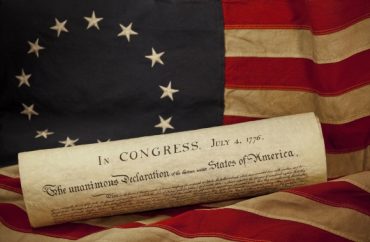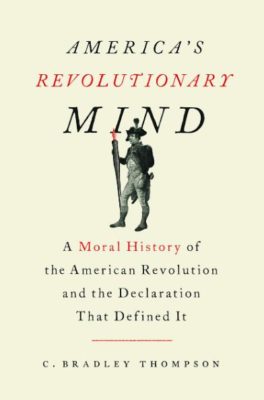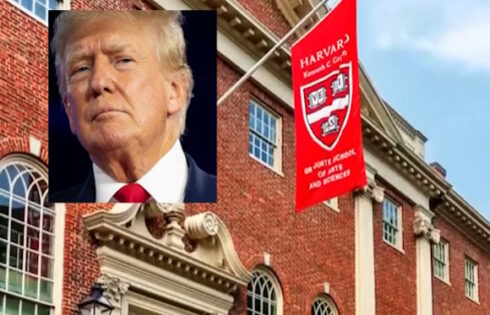
On campuses across America, professors ridicule and attack the nation’s founding principles.
In academia, there is a concerted effort to erase or delegitimize the philosophy of America’s founding documents, the men behind them, and the causes and motivations that led to the Revolutionary War.
But there are some professors willing to present the other side.
Case-in-point: C. Bradley Thompson, a professor of political science at Clemson University and executive director of the Clemson Institute for the Study of Capitalism. In early November his latest book, America’s Revolutionary Mind: A Moral History of the American Revolution and the Declaration That Defined It, was published.
 “We live in an age when America’s intellectual class tells ordinary Americans that our country was founded on immoral ideas and institutions. In other words, they teach Americans — particularly young Americans — to hate America. But of course, a nation that hates itself cannot stand. America’s intellectual class is tearing things down,” Professor Thompson told The College Fix.
“We live in an age when America’s intellectual class tells ordinary Americans that our country was founded on immoral ideas and institutions. In other words, they teach Americans — particularly young Americans — to hate America. But of course, a nation that hates itself cannot stand. America’s intellectual class is tearing things down,” Professor Thompson told The College Fix.
“My hope is that America’s Revolutionary Mind will provide the next generation of young Americans with the intellectual ammunition necessary to defend the principles and institutions on which this country was founded as true,” he said. “I hope that my book will inspire a new generation of young intellectuals who can and will defend the United States of America because its principles and institutions are good.”
The book provides a fresh take on the revolutionary ideas that built America and counter the assault on America’s founding. It “explores the political climate of the American colonies in the 18th century and explains the moral principles and ideas that inspired the American Revolution,” according to the institute.
Professor Thompson told The Fix via email that he was inspired to write the book after he read a very bad, recently published book on the Declaration of Independence by a Harvard professor, “whose interpretation of the Declaration was both wrong and infantile. I thought the Declaration deserved better.”
“As I got deeper into the primary source material, I realized that there was a much bigger and greater story to be told concerning the causes, nature, and meaning of American Revolution.”
He dedicated his book “to all future students of the American Revolution.”
 “I wrote America’s Revolutionary Mind because the principles and institutions of the American founding period have been under assault in this country for the last several decades. As an immigrant to this country, I thought those principles ought to be explained and defended,” he said.
“I wrote America’s Revolutionary Mind because the principles and institutions of the American founding period have been under assault in this country for the last several decades. As an immigrant to this country, I thought those principles ought to be explained and defended,” he said.
Professor Thompson said that while there have been many books written on the political, constitutional, social, economic and military history of the revolution, none have focused on a moral history of the American Revolution. He calls it “the great untold story.”
What’s more, he said, the two best books on the American Revolution were published over 50 years ago. The timing was right to write “a comprehensive reinterpretation of the revolution that would attempt to explain its deepest causes,” he said.
He said he is not sure his peers will use it to teach their students, however. He urges scholars of history, parents, students and others to seek it out and educate themselves.
“My ultimate goal is to change the way that all Americans understand the meaning of the Declaration and the Revolution,” he said.
He said America’s Revolutionary Mind is based on the Declaration’s four self-evident truths:
that all men are created equal;
that they are endowed by their creator with certain unalienable rights, that among these are life, liberty and the pursuit of happiness;
that to secure these rights, governments are instituted among men, deriving their just powers from the consent of the governed;
and that whenever any form of government becomes destructive of these ends, it is the right of the people to alter or to abolish it, and to institute new government, laying its foundation on such principles and organizing its powers in such form, as to them shall seem most likely to effect their safety and happiness.
“Contained in the 98 words of the Declaration’s four self-evident truths is an entire moral and political universe, which says, in sum, that the sole purpose of government is to protect the rights of equal and free individuals,” the professor said.
“The Declaration’s moral philosophy expressed itself during the decade-and-a-half before the battles at Concord and Lexington in the form of what the Revolutionaries called the ‘spirit of liberty.’ … The Americans’ dedication to the ‘spirit of liberty’ as a cardinal virtue is a powerful theme that defines the American response to the issues of the imperial crisis,” he said.
Thompson said the Revolutionary Americans’ “spirit of liberty” was a sentiment, mindset, disposition, virtue.
“As a sentiment, it loves freedom and hates slavery. As a mindset, it is watchful, suspicious, and skeptical of encroaching government power. As a disposition, it is active, jealous, restless, resolute, protective, and, most of all, vigilant against tyranny. And as a virtue, it is defined by integrity, fortitude, perseverance, courage, and patriotism,” he said.
“Taken all together, the ‘spirit of liberty’ is a sense of life defined by independence in the fullest sense of the term. The American spirit of liberty meant discovering and resisting the forces of despotism before such forces could sink roots in the New World.”
In particular, he said, America’s revolutionary mind developed in stages between 1765 and 1776. He said the three great moments that ignited the colonists’ “spirit of liberty” were the passage of the Stamp Act in 1765, the passage of the Coercive Acts in 1774, and the publication of Thomas Paine’s Common Sense in January 1776.
“The most important thing that I’d like readers—particularly college-age readers—to take away from the book is that the self-evident truths of the Declaration of Independence are actually true—absolutely, universally, and permanently true,” Thompson said.
“By contrast, our professors may tell us that we live in a ‘post-truth’ society, which is true as a description of the times in which we live, but of course what they really mean to say is that we should live without objective and absolute truths,” he said.
“They want you to believe that truth is a meaningless concept. The moral orthodoxy of your professors teaches that truth is subjective and relative. Such a view has led to the moral relativism and nihilism that is destroying Western civilization.”
MORE: At my Boston campus, I’ve launched my own American Revolution
Like The College Fix on Facebook / Follow us on Twitter






Please join the conversation about our stories on Facebook, Twitter, Instagram, Reddit, MeWe, Rumble, Gab, Minds and Gettr.